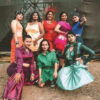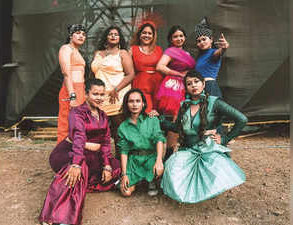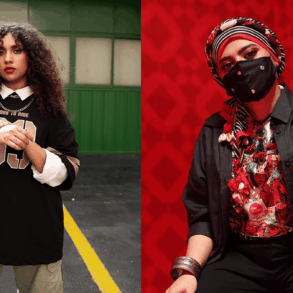Author Raquel Cepeda once said, “The role of hip-hop journalists is to document hip-hop with integrity.” Fifty years ago, that esteemed role did not yet exist, for the culture was too young and too niche to find its way into literary archives and journalistic coverage. But seeing how far hip-hop has come, times have changed, and so have the rules for those documenting it — namely, us women.
The role of women hip-hop journalists, unfortunately by today’s standards, is not just to report on the culture earnestly. Thanks to sexism, patriarchy, and misogyny, we don’t get that luxury. Our skills and knowledge are always under a microscope in this “boys’ club,” as we’ve oftentimes been seen as the ill-informed who stumbled our way into this space and not as the revered who helped build, refine, and make it better; as those who’ve made it safer to tell ours and others’ stories.
While we may not always get our flowers for it, women hip-hop journalists are the trailblazers and tastemakers who have aided the advancement of the culture’s legacy by putting pen to paper (or fingers to keyboard) and voices to microphones. Where would we be if not for women like Dr. Joan Morgan, Dream Hampton, Danyel Smith, Dee Barnes, Angie Martinez, Kierna Mayo, and Aliya S. King? Dedicated journalists, our “Brown Sugar” Sidney Shaws, who have held hip-hop accountable while reporting on its many contributions to the world, as well as the artists who represent it.
To share space with these women, to me, is one of the most gratifying aspects of being part of hip-hop journalism. Without them, POPSUGAR’s celebration of women in hip-hop could not exist. And while some of us are bonded by the trials and tribulations we face in this industry, we’re also united by our passion to keep hip-hop alive and well.
So in honor of that, and hip-hop’s 50-year anniversary, POPSUGAR spoke to a group of seasoned and rising women journalists all together: Clover Hope, the author of “The Motherlode: 100+ Women Who Made Hip-Hop” and who has writing credits in everything from Vibe and XXL to Billboard and Vogue; Kathy Iandoli, the author behind “God Save the Queens: The Essential History of Women in Hip-Hop,” “Baby Girl: Better Known as Aaliyah,” and Lil’ Kim’s upcoming memoir, “The Queen Bee”; Kim Osorio, the author of the exposé book “Straight From the Source” and the first-ever editor in chief of The Source magazine; Rolling Stone staff writer Mankaprr Conteh, who has credits in Vogue, Elle, and Pitchfork; and Kia Turner, an Okayplayer writer, content creator, and music historian.
We talked to them about their experiences documenting hip-hop, the challenges they’ve endured, and their hopes for future generations of women journalists. Read the roundtable discussion ahead.
POPSUGAR: What is the role of the woman hip-hop journalist today?
Kathy Iandoli: I feel that at this stage in the game, there’s even more of an onus placed on women hip-hop journalists. Because it feels like, in so many capacities, male hip-hop journalists are trying very hard to pivot in their storytelling and not in the approach; in the way of how to change the narrative that’s being presented or change the type of storytelling that’s happening as an artist’s career changes or as they get more notoriety.
So right now, women are really at the forefront of being able to handle the brunt of that storytelling, because, personally, I’ve always been a fan more of when women interviewed hip-hop artists. Now more than ever, we have a bigger job to do, especially with the rise of female rappers. I’ve read some horrible conversations where men have interviewed female rappers in the past and I’m just like, “Man, the result would’ve been so different had a woman been doing the interview.”
Kim Osorio: The role of female hip-hop journalists, first and foremost, is the same role as male journalists. I think it’s important for us to do our homework, report responsibly, and make sure that we are covering all POVs in our coverage. But I also feel like it is our role to make sure that we are not erased in these stories, either. As a woman, I’ve had a lot of conversations about how our interests change as we grow but we’re still reporting on the culture. We’re still a big part of hip-hop and the conversation pieces around where we are.
“I think it’s important to make sure that we are heard as women.”
Men and women, you could say that we mature differently. So as we grow older and we start to cover things, we have a different POV. And I think it’s important that that POV remains within our culture. Sometimes that means we’ve got to diversify the way that we’re doing what we do. So whatever your talent is, or however you want to approach storytelling, I think it’s important to make sure that we are heard as women, that we keep our voice, and make sure that we are in positions to be able to tell these stories and that we’re not erased.
Mankaprr Conteh: We have the ability, from our lived experiences, to provide important context to the history and also how it’s impacting today. I can’t help but think about what it was like to be a woman in hip-hop in the ’80s or ’90s or what it was like growing into the culture as a little girl into a full-grown woman.
Kia Turner: There are a lot more opportunities and space for us to write, to be at the forefront, because a lot of the men in hip-hop journalism, they are pivoting. They want to do podcasts, fun content, but when it comes to having those real conversations, when a woman is fronting them, they tend to just be better. And not because of a woman and woman relationship, just, historically, we’ve always carried hip-hop on our backs. But with that being said, I think it also puts us in a weird place because there are certain places that really don’t trust women covering hip-hop in a full capacity. Maybe they’re like, “Oh, you should only stick to talking about the women.” And it’s like, OK, but I could talk about EST Gee, too. I could talk about [NBA] Youngboy. I could do that as well.
PS: Which women hip-hop journalists did you all look up to when you began your careers?
KT: Definitely Kim, Kathy, Danyel Smith, Dream Hampton, Joan [Morgan]. My sister was born in ’88, so she read Vibe, XXL, Source, but then my mom had Essence magazine and Jet. So even seeing Susan [L. Taylor] running Essence, for me, that was so crazy. I was like, “Black women can run a publication. Whoa.” . . . I always felt like I saw so much of myself, especially reading these magazines, and they were in charge of creative direction. They were styling, writing these interviews, and really doing the work for us; showing us it was endless possibilities.
“All of these women laid the groundwork.”
MC: Dream Hampton, for sure. One of the things that really inspires me about Dream is that she’s so good across the medium, and she made the field limitless for me. Of course, we know that she [collaborated with] JAY-Z [for his] book, chronicled all these stories and the generations before me, but then, in my lifetime, becomes massively, culturally relevant with “Surviving R. Kelly.” So it’s like that’s always been my dream for myself. . . . Then another person is Danyel Smith . . . She is the perfect depiction of looking at the world from where you are and being able to see it for what it is but also through who you are.
Clover Hope: I gravitated to Vibe and writers like Danyel Smith, Kim Osorio — when your book came out, I read it twice — Joan Morgan, Aliya S. King, Elizabeth Méndez Berry, Iyana Bird, Kierna Mayo. I remember those names even before I was writing as a journalist.
KO: So I started writing in the early ’90s and, obviously, looked up to all of the women that were named already, but I definitely want to go back to my upbringing. I remember when The Source came out in ’88, but I was a fanzine girl, so Cynthia Horner and Right On! and Jamie Foster Brown with Sister 2 Sister. I loved those magazines. I bought [them] before there was a Source, before there was a Vibe . . . All of these women laid the groundwork, but in addition to them on the print side, I used to watch a lot of video countdown shows, so there were the Dee Barneses of the world and the Big Lezs who are on television reporting and playing that role in broadcast journalism.
KI: My entry point is a little interesting because one of my cousins, her name is Ann Lazzo, she was a writer for Word Up! and all of the Cynthia Horner publications, and she used to send me the magazines. I would see her name, and I was like, “Wait, that’s my cousin, so I need to do this.” I thought I was somehow indoctrinated. I was not a nepo baby of hip-hop journalism, but that was the entry point for me to see a byline from someone I knew.
I got started in hip-hop in ’99, handing out flyers for The Roots and stuff like that. . . . When I did start writing around that time, I was reading Dream Hampton, Dr. Joan Morgan, Joicelyn Dingle, Kierna Mayo, and I chose my byline in lowercase because of Dream, which was also because of bell hooks. But the thing that I remember about Kim specifically was seeing a hip-hop journalist at the helm of a hip-hop publication. That was a whole other beast for me as a journalist, to see a woman who ran the publication.
PS: What issues for women hip-hop journalists have become too normalized today?
MC: Not being acknowledged in a space. I’ve had men explain that sometimes they’re not sure if you’re someone’s girl or something. . . . That’s often less in professional situations and more in professional-adjacent situations, so I’m not working as a music journalist explicitly in that capacity, but I’m in a music space, and there’s a weird lack of acknowledgment happening. Sometimes the trolling can be misogynistic, [too], but I don’t even deal with a lot of that, which I feel very fortunate for, and also like my clock is ticking and it’s coming.
KI: The fact that as female hip-hop journalists, we are constantly in a fight for our own evolution while we’re watching men continuously fight for their access. And we’re never invited to the cigar parties. So our entry point, our access, will always be different from the men because we watch them rise up the ranks in journalism, and their access drastically changes. Whereas we will always have to enter the room differently no matter what.
“I think the big problem is in this industry, being skilled is associated with a masculine trait . . . assuming that our skill and our gender are requisites for where our advancement comes from.”
KO: I’ll never forget, I had a meeting with a girl who reached out to me via DM. She was working as a broadcast journalist and wanted to grow her career. We sat down, and she told me about an opportunity that she was pursuing, and in the conversation, she says to me, “It’s not like I ever slept with him or anything.” And then she kept going, and I stopped her and I said, “Why you tell me that?” And she was like, “I just know how people think.” And so there was this trauma that she had where she felt like she had to justify to me that she didn’t have a relationship with this man that had given her this opportunity. I told her, “I want you to be empowered, and if you did have a relationship with this man or you didn’t, it’s really none of my business. What you did and what you are doing in that space is about your job and your profession and your career moving forward, and your history with this man has nothing to do with nothing.”
A lot of men still have that judgment in them, and they are not held to that same standard when it comes to their careers. . . . We’re trying to prove that we’re professional, and I don’t feel like we should have to do that. Our work should speak for itself.
CH: I think that thinking has definitely prevailed, and I felt it from the beginning of my career as a Black woman in hip-hop, the burden of how you are perceived. . . . I would notice mostly men in the industry questioning your expertise level or your commitment to hip-hop or your knowledge. That was overwhelming, especially as someone who has a bad memory, but also, I was still doing my learning when I came in. . . . And it came from artists. I talk about Ludacris in my book, where I’m interviewing him and by the end, he’s like, “Oh, I perceived you as someone who like, what does this girl really know about hip-hop?” That was his first impression. And then he’s like, “As I talk to you, I understand you’re a hip-hop head.” And I was like, “Thank you?”
Artists using diminutive language like, “Oh darling, hey sweetheart,” and obviously sometimes it’s them being a Southern gentleman, but you can tell the context it’s being used and if it’s being condescending.
KI: I think the big problem is in this industry, being skilled is associated with a masculine trait . . . assuming that our skill and our gender are requisites for where our advancement comes from. I had a rapper once, I went up to him and said, “Hey, I reviewed your album for [such and such].” [He said], “Oh my God, that was you? That was such a good review. I thought it was done by a guy.” And I remember that. Then years later, I sat him down and was like, “Don’t ever say that to another woman who holds a pen again, because that’s horrible.” But I think it does boil down to that idea of skill in hip-hop journalism being seen as masculine. Even though a lot of the time, we do better jobs at some of these articles because we don’t want to hang out all day until the lights come on . . . I don’t want to smoke a cigar. I just want to do my job.
PS: Where do you want to see women in hip-hop journalism in the future?
MC: I hope there are a lot more of us across genres and in cultural journalism, period. But primarily in hip-hop journalism, it seems like so much of [it] is moving from written media, and so I would love to see more Black women with podcasts; very smart, engaging, well-received, and watched podcasts and news shows, because most of the hip-hop journalists that are women that I know working today are primarily writers.
“There are so many different angles to the story and so many ways to diversify the portfolio when it comes to talking about women in hip-hop.”
KO: I don’t know if you guys love it like I do, but I love seeing the angry men on social media talk about how women are running the rap game. If you notice, a lot of men are like, “There’s no room for us as men, we can’t get in.” It’s the funniest thing to me to see in 2023. Young male rappers complaining about the fact that there are too many women. . . . It’s like a role reversal, but it’s one or two years that you have that, right? I want to see the day when that happens in the journalism space. . . . I talk to a lot of the podcasters that are out now like, “You’re alienating women in the hip-hop conversation.” Obviously, we could talk about relationships, beauty products, our nails and our hair, but in the context of a hip-hop conversation, they’re alienating the female perspective. So I’d like to see that change in our space with what we’re doing and how we’re covering these stories, because we have so much more to offer.
CH: I’m so glad that we were talking about audio, [because] I do think that is a space where you hear so many men taking over the conversation. . . . That podcast space, [we should] have more shows where they’re talking about women in hip-hop or [other shows] that address that this is not just a moment in time. We can continue this conversation about women with more documentaries. I’ve seen so many about Biggie and Tupac, and then it’ll be like, OK, we got one on women, we’re good. And it’s like, no, let’s have like 20. There are so many different angles to the story and so many ways to diversify the portfolio when it comes to talking about women in hip-hop.
I would like to see us take up space on all of these different platforms. More books, audiobooks, podcasts, shows, documentaries. I just don’t want it to disappear or have this attention go away . . . Hopefully, we continue nurturing the next generation of young women like yourself. I’m so glad you are doing this roundtable and inviting us to speak on it and carry that tradition of women bigging up other women and telling these stories, because the guys are not going to do it.
This post was originally published on this site be sure to check out more of their content.







